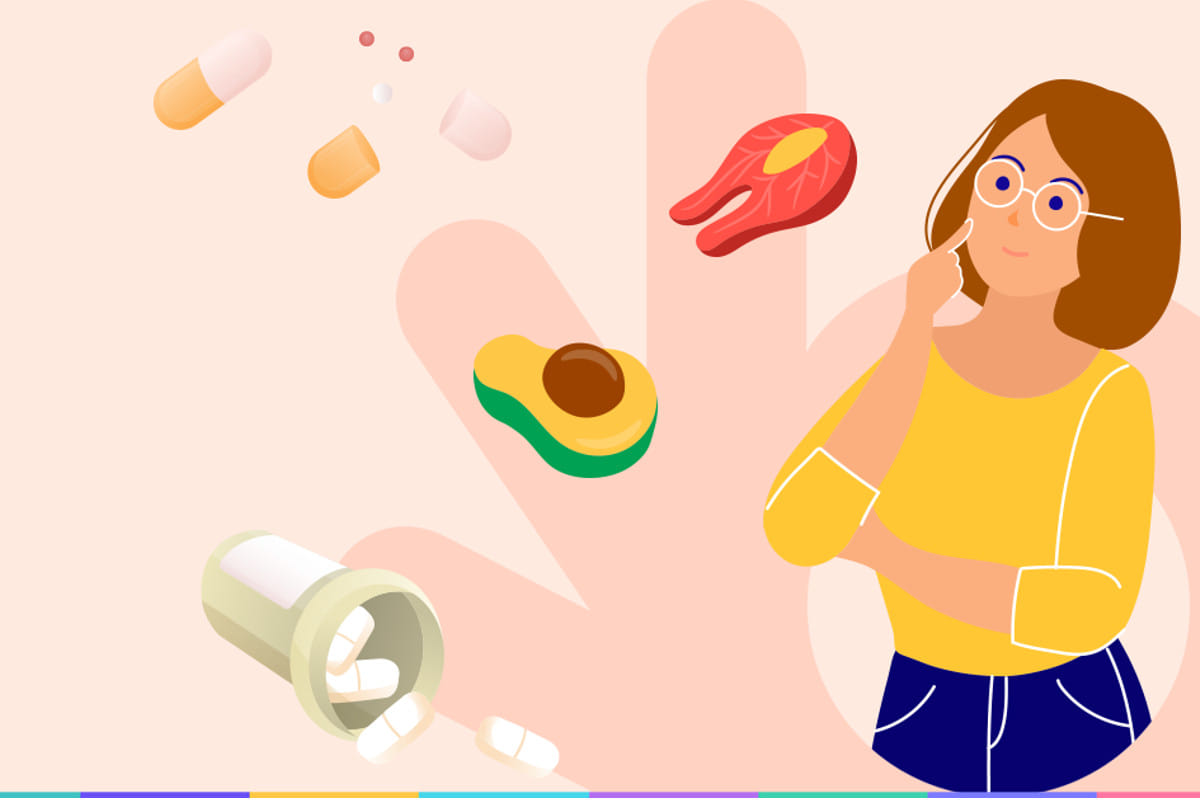Biotin is a B vitamin found in many foods. Biotin helps convert the carbohydrates, fats and proteins in the food you eat into the energy you need.
How Much Biotin Do I Need?
The amount of biotin you need each day depends on your age. Average daily recommended amounts are listed below in micrograms (mcg).
| Age | Recommended Amount |
|---|---|
| From birth to 6 months | 5 micrograms |
| 7-12 month old babies | 6 micrograms |
| Children 1-3 years old | 8 micrograms |
| Children 4-8 years old | 12 micrograms |
| Children aged 9-13 | 20 micrograms |
| Young people aged 14-18 | 25 micrograms |
| Adults 19 and over | 30 micrograms |
| Pregnant teenagers and women | 30 micrograms |
| Breastfeeding teenagers and women | 35 micrograms |
What Foods Provide Biotin?
Many foods contain some biotin. You can get the recommended amount of biotin by eating a variety of foods, including:
- Meat, fish, eggs and offal (such as liver)
- Seeds and nuts
- Some vegetables (such as sweet potatoes, spinach and broccoli)
What Types of Biotin Dietary Supplements Are Available?
Biotin is found in some multivitamin / multimineral supplements, B complex supplements, and biotin-only supplements.
Supplementary food types for daily Biotin needs are at bicalite

You can meet your daily Vitamin B7 / Biotin needs with the supplement products offered by Bikalite.
Am I Getting Enough Vitamin B7 / Biotin?
Most people get enough biotin from the foods they eat. However, certain groups of people are more likely to have difficulty getting enough biotin than others:
- People with a rare genetic disorder called “biotinidase deficiency”
- People with alcohol addiction
- Pregnant and breastfeeding women
What Happens If I Don't Get Enough Biotin?
Biotin deficiency can cause hair thinning and body hair loss. Rashes in the eyes, nose, mouth and anal area, pink eye, high acid levels in the blood and urine, seizures, skin infection, brittle nails and nervous system disorders may occur. Symptoms of biotin deficiency in babies include poor muscle tone, weakness and developmental delay.
What Are Some Effects of Biotin on Health?
Scientists are studying biotin to understand how it affects health. Here is one of the results of this research:
Hair, nail and skin health: Dietary supplements containing biotin are often promoted as improving the health of your hair, skin and nails, but there is little scientific evidence to support these claims. In several small studies, some people with thin, brittle nails who took high doses of biotin had tougher nails. Doctors have also reported in a few cases that high doses of biotin improved a rare hair disorder in children and skin rashes in infants. More research is needed before biotin supplements can be recommended for any of these conditions.
Vitamin B7 / Biotin supplement types

Your right address for the quality and original Vitamin B7 / Biotin varieties you need is bikalite.com
Can Biotin Be Harmful?
Biotin has not been shown to cause any harm. However, supplements containing biotin in excess of recommended amounts may cause false results on some laboratory tests, including measurements of certain hormones such as thyroid hormone.
Does Biotin Interact with Medications or Other Dietary Supplements?
Some medications you take can affect your biotin levels and may interact with some medications.
Tell your doctor, pharmacist, and other health care providers about the dietary supplements and prescription or over-the-counter medications you take. They can tell you whether dietary supplements interact with your medications or lab tests, or whether medications affect your body's ability to absorb, use, or break down nutrients such as biotin.
Biotin and Healthy Nutrition
People should get most of their nutrients from food and drink. Foods contain vitamins, minerals, dietary fiber and other components that benefit health. In some cases, fortified foods and dietary supplements are useful when it is not possible to meet the needs of one or more nutrients (for example, during certain life stages, such as pregnancy).
Disclaimer
This fact sheet, prepared by the Office of Dietary Supplements (ODS), provides information that should not replace medical advice. We encourage you to talk with your healthcare providers (doctor, registered dietitian, pharmacist, etc.) about your interest in, questions about, or use of dietary supplements and what may be best for your overall health. Mention of a particular product or service or recommendation from an organization or professional society in this publication does not imply endorsement by ODS of that product, service, or professional advice.
Note: This article is a translation of ODS information and the translation has not been reviewed by ODS.
Source:
- This article has been translated from the Biotin article.

